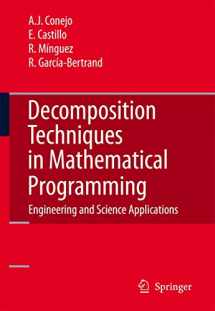
Decomposition Techniques in Mathematical Programming: Engineering and Science Applications
ISBN-13:
9783642066078
ISBN-10:
3642066070
Edition:
Softcover reprint of hardcover 1st ed. 2006
Author:
Enrique Castillo, Antonio J. Conejo, Roberto Minguez, Raquel Garcia-Bertrand
Publication date:
2010
Publisher:
Springer
Format:
Paperback
558 pages
FREE US shipping
Book details
ISBN-13:
9783642066078
ISBN-10:
3642066070
Edition:
Softcover reprint of hardcover 1st ed. 2006
Author:
Enrique Castillo, Antonio J. Conejo, Roberto Minguez, Raquel Garcia-Bertrand
Publication date:
2010
Publisher:
Springer
Format:
Paperback
558 pages
Summary
Decomposition Techniques in Mathematical Programming: Engineering and Science Applications (ISBN-13: 9783642066078 and ISBN-10: 3642066070), written by authors
Enrique Castillo, Antonio J. Conejo, Roberto Minguez, Raquel Garcia-Bertrand, was published by Springer in 2010.
With an overall rating of 4.5 stars, it's a notable title among other
books. You can easily purchase or rent Decomposition Techniques in Mathematical Programming: Engineering and Science Applications (Paperback) from BooksRun,
along with many other new and used
books
and textbooks.
And, if you're looking to sell your copy, our current buyback offer is $0.3.
Description
Optimization plainly dominates the design, planning, operation, and c- trol of engineering systems. This is a book on optimization that considers particular cases of optimization problems, those with a decomposable str- ture that can be advantageously exploited. Those decomposable optimization problems are ubiquitous in engineering and science applications. The book considers problems with both complicating constraints and complicating va- ables, and analyzes linear and nonlinear problems, with and without in- ger variables. The decomposition techniques analyzed include Dantzig-Wolfe, Benders, Lagrangian relaxation, Augmented Lagrangian decomposition, and others. Heuristic techniques are also considered. Additionally, a comprehensive sensitivity analysis for characterizing the solution of optimization problems is carried out. This material is particularly novel and of high practical interest. This book is built based on many clarifying, illustrative, and compu- tional examples, which facilitate the learning procedure. For the sake of cl- ity, theoretical concepts and computational algorithms are assembled based on these examples. The results are simplicity, clarity, and easy-learning. We feel that this book is needed by the engineering community that has to tackle complex optimization problems, particularly by practitioners and researchersinEngineering,OperationsResearch,andAppliedEconomics.The descriptions of most decomposition techniques are available only in complex and specialized mathematical journals, di?cult to understand by engineers. A book describing a wide range of decomposition techniques, emphasizing problem-solving, and appropriately blending theory and application, was not previously available.


We would LOVE it if you could help us and other readers by reviewing the book
Book review

Congratulations! We have received your book review.
{user}
{createdAt}
by {truncated_author}


